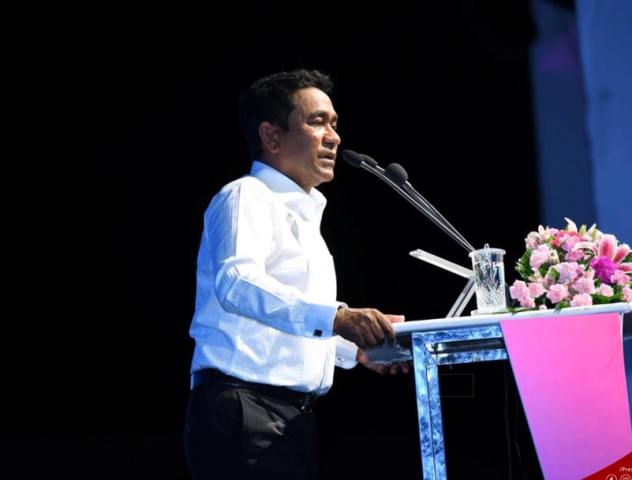 The government of Abdulla Yameen declared a 15-day state of emergency, claiming it was putting down an attempted coup. [photo: President's Office on Facebook]
The government of Abdulla Yameen declared a 15-day state of emergency, claiming it was putting down an attempted coup. [photo: President's Office on Facebook]
The simmering political crisis in the Maldives boiled over again on 5 February when a 15-day state of emergency was declared and two supreme court judges and the president’s half-brother were arrested by the government of Abdulla Yameen, which claimed it was putting down an attempted coup.
The latest flashpoint follows several years of tension since Mohamed Nasheed, the Indian Ocean nation’s first democratically-elected president, was ousted in 2013 amid claims of rigged elections and after mounting allegations of corruption and political repression by the Yameen government. It came when the supreme court ordered the release of nine opposition politicians, saying they had been denied due process, and reinstated 12 MPs removed from office for defecting from the ruling party and thereby restoring the opposition’s parliamentary majority.
According to the Indian analyst Rajeev Sharma, the Maldives was abuzz with rumours that the court would order the impeachment of Yameen, who warned the judges not to overreach themselves and sent troops to blockade parliament. Soldiers were sent into the court to detain the chief justice, Abdulla Saeed, and another judge, Ali Hameed; two police chiefs were sacked and the former president Maumoon Abdul Gayoom was arrested (after breaking with his half-brother to side with Nasheed last year). The three remaining supreme court judges then rescinded their ruling and the acting police commissioner, Abdulla Nawaz, claimed there was proof that Saeed and Hameed had accepted bribes for issuing the ruling, AP reported. Meanwhile, the government sent envoys to China, Pakistan and Saudi Arabia to bolster support for Yameen as international criticism mounted: the UN’s high commissioner for human rights, Zeid Ra’ad Al Hussein, called it ‘an all-out assault on democracy’ and the US issued stern criticism, CNN reported. ‘President Yameen has systematically alienated his coalition, jailed or exiled every major opposition political figure … revised laws to erode human rights … and weakened the institutions of government,’ the State Department said.
As well as Nasheed, the Maldivian Democratic Party leader now in exile in Sri Lanka, opposition figures whose convictions were overturned included Gasim Ibrahim, MP and Jumhoree Party leader who was given asylum in Germany; and the head of the main Islamist faction, the Adhaalath party, Imran Abdulla, who was jailed for 12 years in 2016 on a terrorism charge. The court had also ordered the release of Faris Maumoon, MP and son of Gayoom; and Ahmed Adeeb, a former vice-president jailed over a dubious bomb plot.
Nasheed urged India to intervene, tweeting that Delhi should send an ‘envoy, backed by its military’ because of increasing Islamist radicalisation and what he called a Chinese land grab. ‘I can’t understand how our president is able to arrest our chief justice, occupy our parliament and still pretend it’s business as usual,’ he told the Times of India, warning that Maldivians recruited to fight for Isis were returning and becoming embedded in the police and armed forces, creating a ‘state within a state’. Playing on Indian fears of China’s ‘string of pearls’ strategy of securing maritime infrastructure at key points around the Indian Ocean, Nasheed also suggested the growing Chinese role in the Maldives economy had ulterior motives: ‘You can’t propagate dictatorship in the name of development assistance.’ Nasheed denied calling for ‘gunboat diplomacy’ but suggested India could play a more muscular role ‘with soft power involved … it doesn’t have to be messy military adventurism’ (he may have had in mind India sending troops to help Maumoon Gayoom counter an attempted coup by Sri Lankan mercenaries in 1988). However, Beijing denied any undue influence, the South China Morning Post reported. ‘China’s aid to the Maldives has no political strings attached and does not harm the Maldives’ sovereignty and independence at all, still less jeopardise security in the Indian Ocean,’ the foreign ministry said.



